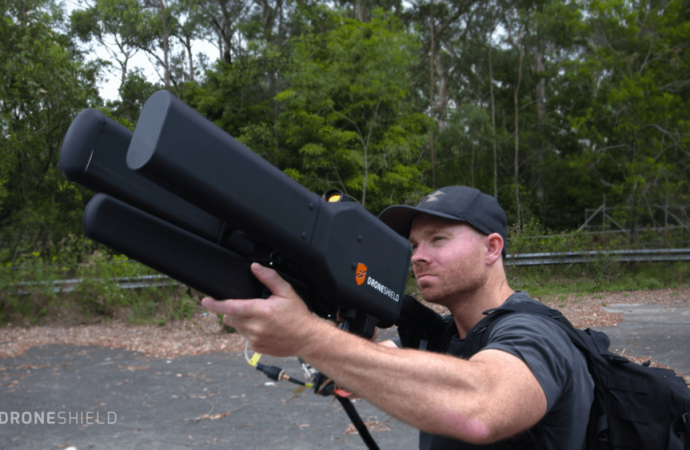Who you gonna call? Dronebusters
Drones are flying bundles of sensors and radio waves, sometimes put to nefarious purpose. In Iraq, the insurgent group ISIS put this combination to deadly effect, killing enemies and assembling a small aerial arsenal. Small, deadly drones used to kill are relatively new to battlefields, so companies are making new weapons to take drones down.
The latest, from DroneShield, is the plainly-named “Dronegun.” The company claims the weapon has a range of over a mile, and promises to immediately cease video transmission back to the drone operator. While borrowing a form-factor and name from firearms, the Dronegun appears to be like other anti-drone jamming rifles: an antenna attached to a computer and shaped like a gun.
We’ve previously seen the DroneDefender, an anti-drone antenna-rifle by Battelle Memorial Institute. We’ve already seen photographs showing weathered and deployed DroneDefenders in Iraq. And abroad makes sense; DroneShield’s Dronegun page contains a large and explicit disclaimer that “this device is not, and may not be, offered for sale or lease, or sold or leased, in the United States, other than to the United States government and its agencies” until it’s authorized by the FCC. Why the FCC? These antenna-guns are jamming and control devices, sending radio signals that interfere with and overpower the commands given by the drone’s pilot. Jamming devices are prohibited within the United States, no matter how useful they may prove on the battlefields around Mosul.
Using a much simpler antenna-rifle and a known override in a Parrot drone, West Point cadets trained this past summer to take down and maneuver in battlefields against opponents flying drones. That training, intended to prepare future Army officers for hypothetical battlefields of tomorrow, may come into use much sooner than anticipated, with multiple companies making multiple anti-drone tools to counter a novel threat.
It’s worth noting that, while exploding drones appear to be part of ISIS’s arsenal, the radical group has killed far more people and had far more military success converting cars into bombs. Drones, at most, can carry a couple pounds of explosive. Cars can carry hundreds of pounds of bombs instead.
Source: Popular Science

































Leave a Comment
You must be logged in to post a comment.